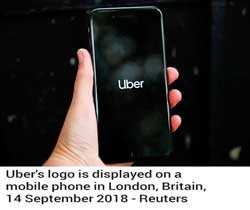Wednesday Feb 25, 2026
Wednesday Feb 25, 2026
Monday, 25 February 2019 00:00 - - {{hitsCtrl.values.hits}}
SAN FRANCISCO (Reuters): Uber Technologies Inc had $50 billion in total bookings for its ride-service and food-delivery businesses last year, a testament to the size and global reach of the company as it prepares to woo investors in one of the biggest public stock listings to date.

But figures released by the company on Friday showed revenue grew just 2% in the fourth quarter, a sign that Uber continues to heavily subsidise rides in competitive markets, raising questions about its future growth prospects.
Uber’s full-year revenue for 2018 was $11.3 billion, up 43% from the prior year. Its losses before taxes, depreciation and other expenses were $1.8 billion, an improvement over the $2.2 billion loss posted in 2017.
Uber highlighted the annual bookings figure, which was up 45% over 2017, in its release on Friday of a smattering of selected figures for its fourth-quarter and full-year results, a practice it has had for the last several quarters as it anticipated going public. The full-year figures are particularly important to show potential investors the trajectory of the business, as opposed to Uber’s more erratic quarterly results.
Uber in December filed confidentially for an initial public offering, which may come as early as the second quarter this year. It is racing neck-and-neck with rival Lyft to become the first ride-hailing IPO.
“Last year was our strongest yet, and Q4 set another record,” Uber Chief Financial Officer Nelson Chai said in a statement.
Uber said gross bookings for the fourth quarter were a record $14.2 billion, up 11% from the prior quarter.
That marks an improvement after bookings growth slowed to just single-digit percentages throughout much of last year.
Uber’s revenue in the fourth quarter reached $3 billion, up 2% from the third quarter and a 24% increase over the previous year.
The food-delivery service, Uber Eats, accounts for more than $2.5 billion in bookings quarterly, according to a person with knowledge of the matter. Uber has trumpeted Uber Eats as the largest online food delivery business outside of China. Uber must convince public market investors that its market share, growth trajectory, global scale and diversity of businesses make it a compelling investment, despite its enormous losses.
“Uber needs to show it can control costs and can make money, basically provide a strong argument that its business model is not broken and that it can achieve and sustain profitability despite issues with drivers, customers and politicians,” said David Brophy, Professor of Finance at the University of Michigan’s Ross School of Business.